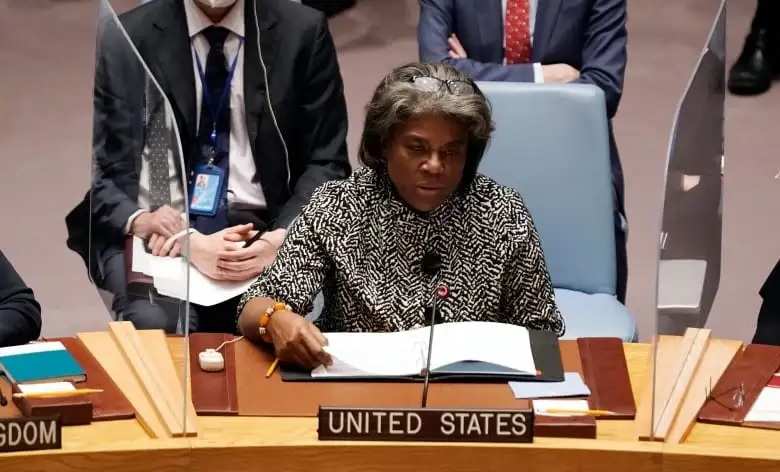Russia Vetoes UNSC Resolution That Rejects Its Invasion On Ukraine — China, India, UAE Abstain

Russia vetoed a UN Security Council resolution condemning its invasion of Ukraine on Friday, while China, India, and the United Arab Emirates voted no.
The remaining 11 members of the council voted in favour, allowing the draught resolution to be considered by the UN General Assembly’s 193 members.
“You may reject this resolution, but you can’t veto our voices,” US Ambassador to the UN Linda Thomas Greenfield told her Russian counterpart and the UN Security Council.
She went on to say: “You can’t put a stop to the truth. You don’t have a veto over our values. You cannot override the will of the Ukrainian people. The UN Charter cannot be vetoed.”
The United States assisted in the drafting of the non-binding resolution and sought a vote to put council members on the record. The widespread condemnation of Russian President Vladimir Putin’s attack on a sovereign democracy is yet another effort by Western countries and their allies to further isolate Russia politically.
Later, UN Secretary-General António Guterres announced the appointment of Sudanese national Amin Awad as an assistant secretary-general to serve as the UN’s Ukraine crisis coordinator.
Awad previously served as the UN’s regional refugee coordinator for the Syria and Iraq crises, as well as the head of the UN High Commissioner for Refugees’ Middle East and North Africa Bureau.
Eleven members voted in favour of the US-drafted resolution, which calls on Russia’s soldiers in Ukraine to leave immediately, completely, and unconditionally. China, which is assumed to be on Moscow’s side, refrained. In a setback for the US, two of its allies, India and the United Arab Emirates, did the same.
Related: United Stated & Allies Impose New Sanctions on Russia Amid Ukraine Crisis — Times Read
However, American officials hailed the starkness with which Russia’s “isolation” was depicted as a big accomplishment. They also promised to forward a similar resolution to the whole 193-member General Assembly, where there are no vetoes and just a simple majority is required for passage.
Linda Thomas-Greenfield, the United States’ ambassador to the United Nations, said she was not shocked by Russia’s veto, but that it would not dissuade efforts to condemn and halt Moscow’s actions.
“You may reject this resolution, but you can’t veto our voices,” she remarked, staring straight at the Russian delegate, Vasily Nebenzya, who was chairing the session as rotating president of the UN Security Council, in one of the strangest aspects of UN politics.

“You can’t put a stop to the truth,” Thomas-Greenfield added. “You don’t have a veto over our principles.” You cannot override the will of the Ukrainian people. You can’t veto the United Nations Charter. You will not be able to veto responsibility.”
Nebenzya chastised Thomas-Greenfield and many other Western representatives for what they had described as heinous abuses and attacks on civilians by Russian soldiers after the vote but while the council was still in session. He said, “Who are you to moralise?” Thomas-Greenfield returned his stare with a stony expression.
He had a tense exchange with the Ukrainian ambassador, Sergiy Kyslytsya. Nebenzya labelled his Ukrainian colleague “boorish,” while Kyslytsya said Nebenzya deserved a special “place in hell” for his statements accusing Ukraine of tyranny.
Senior US officials lobbied hard for their colleagues from dozens of nations to support the resolution in the Security Council or at a later meeting of the United Nations General Assembly, when a similar censure might be made.
A few hours before the vote, State Department spokesperson Ned Price predicted that Russia would be “exposed to be alone on the international stage.”
Although the Americans were upset that India and the United Arab Emirates did not vote “yes,” they were relieved by China’s choice to abstain.
Before the meeting on Friday, US diplomats predicted that Beijing would support Moscow. However, there were rays of hope: President Xi Jinping has officially expressed his backing for the invasion.
He may be hesitant to initiate a confrontation with the US and NATO, despite the fact that he favours a strengthening relationship with Moscow.
Although China does not condone breaching another country’s sovereignty, as Russia has done, the resolution may add “fuel to the fire” rather than contribute to a diplomatic road to peace, according to Zhang Jun, China’s envoy to the Security Council. Russia’s “legitimate security ambitions,” he added, must be met.
“Ukraine should become a link between East and West, not a staging ground for big power clashes,” Zhang added.
Similarly, while the UAE and India condemned Russia’s conduct, they expressed concern that the resolution would close the door to diplomacy and engagement. Both nations have close relations to Russia, particularly India.
The Security Council vote came after the Biden administration announced tougher economic penalties on Russia on Thursday — and on Putin himself on Friday — which were bolstered by a slew of EU actions.
However, gaining broader backing for a denunciation of Russia had proven to be a difficult challenge for American officials. Secretary of State Antony J. Blinken and his deputy, Wendy R. Sherman, were on the phone with counterparts from a number of countries, including Portugal, Turkey, Moldova, Israel, and Saudi Arabia.
Months of physical and virtual meetings and warnings among friends about Russia’s plans for Ukraine led to these efforts.
Russia’s incursion into Ukraine has sparked Europe’s worst security crisis in decades, with concerns of carnage and a return to Cold War dynamics.
India had been a particularly difficult situation. In addition to its longstanding connections with Moscow, New Delhi has developed a major defence and diplomatic relationship with the United States in recent years.
However, India’s immediate response to Russia’s actions was lukewarm. India’s envoy urged for de-escalation but did not denounce Russia during a Security Council meeting in New York on Wednesday night as President Vladimir Putin unleashed Russian soldiers on Ukraine. So, while India’s abstention on Friday was not a “yes,” diplomats felt it might have been worse.
A Kremlin-backed misinformation campaign in Russia and the United States aims to increase support for — or at the very least muddle the waters surrounding — Putin’s invasion of Ukraine.
Any suggestion that the difficulty in putting together a united front reflected the impotence of consensus-based global organisations like the United Nations and especially the Security Council.
Russia and China, along with the United States, France, and Germany, are permanent members, was dismissed by a Biden administration official briefing reporters on the US strategy for the Security Council. The rotating president’s seat on the council is currently held by Russia.
“It’s critical that we send a message to Ukraine, Russia, and the rest of the world that the Security Council will not turn a blind eye,” the person said, speaking on the condition of anonymity to discuss behind-the-scenes discussions. “The council was formed in response to just this scenario: a stronger country fighting a smaller neighbour in defiance of the United Nations Charter and its ideals.”
However, after the Security Council meeting, UN Secretary-General António Guterres expressed his disappointment to reporters.
He explained that the United Nations “was formed out of conflict, to stop war.” “That aim was not met today.”
Source: UNSC
